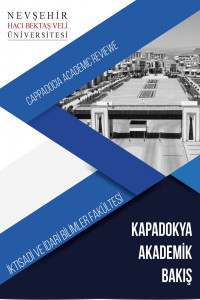Research Article
Dissertation
Book Review
Aim & Scope
Cappadocia Academic Journal accepts and publishes both international and interdisciplinary articles on the fields of political sciences, public administration, international relations, business administration and economics as Turkish and English. As a young academic journal, it aims to publish international standards for researchers.
Cappadocia Academic Reviewe (CAR) aims to publish scientific works in the fields of political, economic and social science as a national refereed journal of the Faculty of Economics and Administrative Sciences of Hacı Bektaş Veli University of Nevşehir. KAB started its publication life in 2017 and is published in January and July as 2 issues per year
Author Guidelines
Notes for Contributors
1.Cappadocia
Academic Review (CAR) aims at contributing to the political sciences. The
Journal accepts and publishes both international and interdisciplinary articles
on the fields of political sciences, public administration, international
relations, business administration and economics.
2. Articles submitted to the Journal are first reviewed by the Editorial Board,
and then sent two (or three) different referees. According to the reports of
the reviewers the Editorial Board either accepts or rejects an article, or
decides to send the article for revision. Articles sent after revision are
reviewed again by the Editorial Board.
3.Articles submitted should have been published or submitted to another Journal
previously. Articles should have been written in accordance with research and
publication ethics.
4. All articles submitted are checked by plagiarism software.
5. Electronic submissions are accepted through https://dergipark.org.tr/car or
directly to car@nevsehir.edu.tr mail address.
6. all articles are accepted as Turkish or English.
7.
Authors should send their affiliations, ORCID code with the article.
8. Formatting guideline for manuscripts is as follows:
Font
The font used in the entire manuscript should be
Times New Roman, font size 11. For tables and figures, see below.
Page Layout
Page margins for bottom, top, right, and left should
be pre-set as 4cm. Text should be justified with no hyphenation breaks in words
at the end of a line.
Text should be typed as a single-column document.
Paragraphs and headings should not be indented, but aligned with the main text.
Paragraph Format
Paragraph indents should be pre-set in the tabs
section as follows:
• before and after: 0 pt
• line spacing: 1,5
Page Limit
Manuscripts prepared in compliance with the guidelines should not exceed 30 pages.
Title
Article titles should be boldfaced and centered.
Author(s)’s Names The main document is used for peer-review, which
may include the title, abstract, key words, main body,
references, figures and tables and supplementary materials. The names of all
authors and their institutions should not be included in the main document.
Abstract
Abstracts should be between 150–200 words.
No citations should appear in the abstract.
Keywords
5–8 words representing the manuscript should be
given as keywords.
Main Text
Qualitative and quantitative studies should contain
the following sections: Introduction, Method, Findings, and Discussion.
The Methods section must include Sampling/Study Population, Data Collection
Tools, and Procedure as sub- sections if an original research method has been
used.
Literature reviews should elaborate on the problem, analyze the relevant
literature, emphasize the gaps and inconsistencies in the literature, and
discuss actions toward solving these problems.
References
Both in-text citations and references should comply
with the APA guidelines as provided in the Publication Manual of American
Psychological Association (APA) (6th edition).
Tables and Figures
Tables, figures, pictures, graphics, and similar
aspects should be embedded in the text, and not provided as appendices.
Under the Paragraph tab, ensure that the indentation is as follows:
• before and after: 0
• spacing: Single
Tables and figures should be left aligned, and the text wrapping feature should
be turned off.
Appendices
Each appendix should be displayed on a separate page
after the references section.
The heading style consists of five possible formatting arrangements, according
to the number of levels of subordination. Each heading level is numbered (see
below).
Levels of Heading
Format
1 Centered, Boldface, Uppercase and Lowercase Heading
2 Flush Left, Boldface, Uppercase and Lowercase Heading
3 Indented, boldface, lowercase paragraph heading ending
with a period. (In a lowercase paragraph heading, the first letter of the first
word is uppercase and the remaining words are lowercase.)
4 Indented, boldface, italicized, lowercase paragraph
heading ending with a period.
5 Indented, italicized, lowercase paragraph heading
ending with a period.
More than five levels of headings are not advisable.
Table and Figure
Headings
Table and figure numbers should be typed as “Table
1” or “Figure 1”
Table and figure headings should be in italics.
Emphasis
Do not use boldfaced characters in text. Emphasis
should be expressed using quotation marks (“”) or italics.
Listing
Lists in text should be horizontal and not vertical.
Further, the list should use Roman numeral [(i), (ii), and so on], not Arabic
(1, 2).
Direct Quotations
Direct quotes should be left-indented from the main
text and typed in 9-point font. They need not be italicized.
Please refer to the sample manuscript for examples.
Ethical Principles and Publication Policy
1. Dergiye gönderilecek makaleler, daha önce yayınlanmamış veya başka herhangi bir yerde yayın sürecine girmemiş olmalıdır. Yayınlanması amaçlanan makalelerin bilimsel araştırma ve yayın kurallarına uygun biçimde hazırlanacağı konusunda yazarlardan hassasiyet beklenmektedir.
2. KAB Dergisine başvuran makaleler, uluslararası yayın etiği kuralları gereği intihal programı ile taranmaktadır. Benzerlik oranı % 20'yi aşan makaleler yazarına iade edilir.
Price Policy
Dergimiz ücretsiz yayım yapmaktadır.
Indexes
Journal Boards
Editor-in-Chief
Editors
Field Editors




Leyla KAHRAMAN Adana doğumlu olup ilk ve ortaöğrenimini Adana'da tamamladı lisans ve yüksek lisans öğrenimini İnönü Üniversitesi Kamu Yönetimi Bölümü’nde, doktorasını Hacettepe Üniversitesi Kamu Yönetimi Bölümü Siyaset ve Sosyal Bilimler Anabilim Dalı’nda tamamladı. Araştırma görevliliğine İnönü Üniversitesi Kamu yönetimi bölümünde başlayan KAHRAMAN 2010 yılından itibaren Nevşehir Hacı Bektaş Veli Üniversitesi’nde öğretim üyesi olarak çalışmaya başladı. 2017 yılında doçent, 2019 yılında evlenerek KAHRAMAN YÜCE olarak hayatına devam eden akademisyenin çalışma konuları ve ilgi alanları özellikle; demokrasi, siyasi partiler, medya ve siyaset, toplumsal cinsiyet ve İran başlıklarında yoğunlaşmaktadır. KAHRAMAN YÜCE hala Nevşehir Hacı Bektaş Veli Üniversitesi Kamu Yönetimi Bölümü’nde öğretim üyesi olarak çalışmaktadır.
English Language Editing
Compositor
Index Editor






